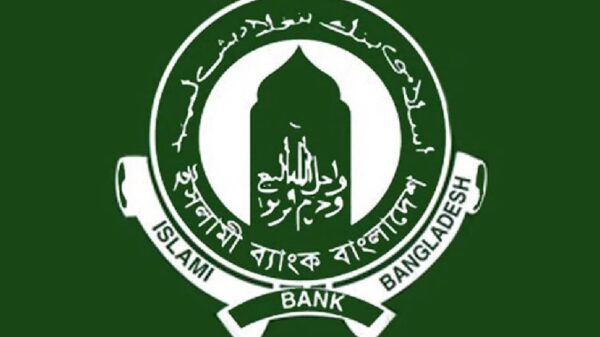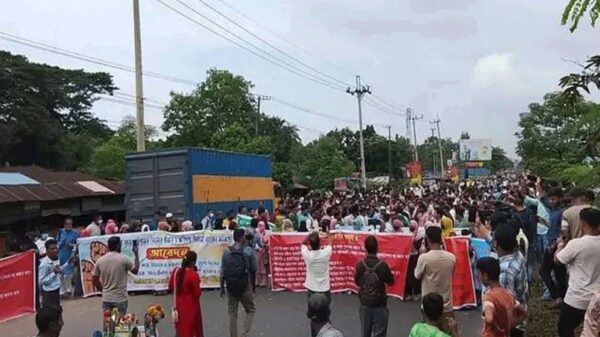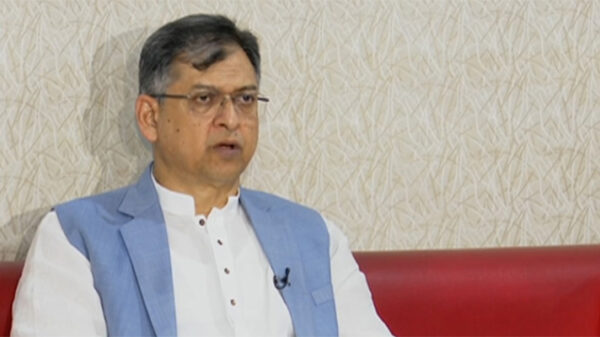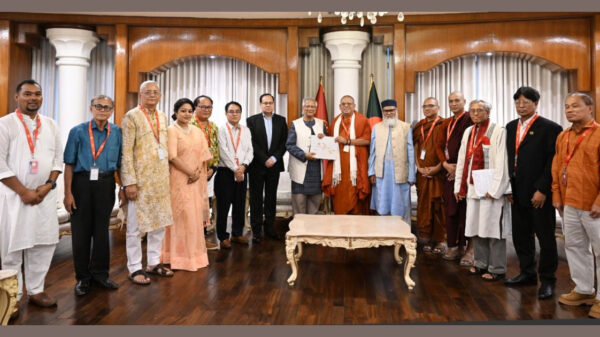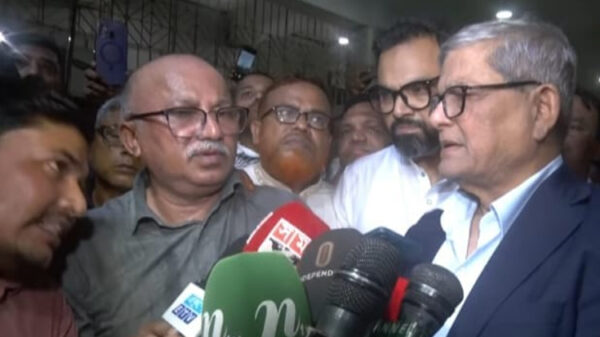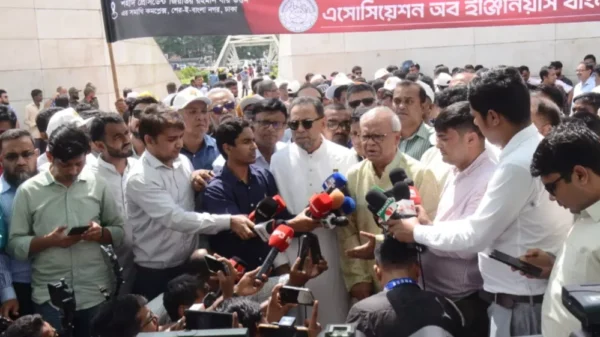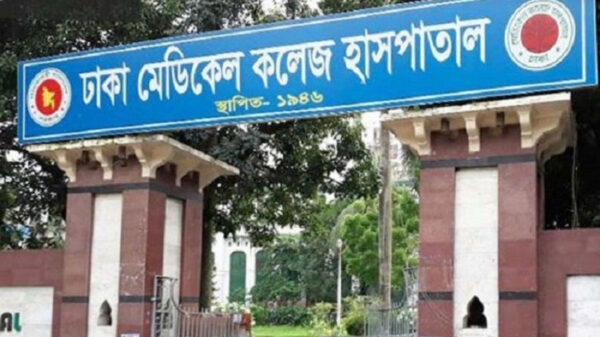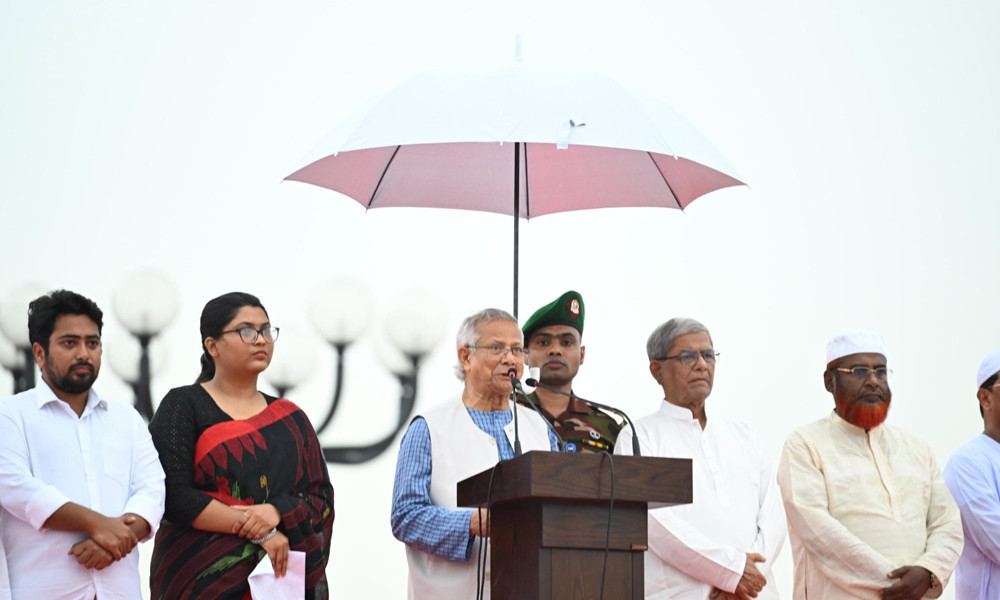Staff Reporter:
The rain came down on Tuesday, as it often does in Dhaka this time of year, but it did not dampen spirits. On the wide stretch of Manik Mia Avenue, umbrellas popped like flowers, flags waved, and music poured from speakers. One year on from fascist Sheikh Hasina’s dramatic flight from power in the face of a student-led uprising, the city gathered to mark what many are now calling Bangladesh’s second rebirth.
But beyond the festivities, something more solemn and ambitious was unfolding – a public reading of the July Declaration, a document that could shape the future of the country in more ways than one.
At just past five in the evening, Nobel Laureate and the interim government’s Chief Adviser Prof Muhammad Yunus stepped onto the stage at the South Plaza of the National Parliament. Flanked by key leaders of the anti-fascist political forces and parties, he began to read the July Declaration before a buzzing, expectant crowd. The words were not just ceremonial; they were loaded with history, with outrage, with hope. As he spoke, a hush fell. People listened not like it was politics, but like it was a promise.
The July Declaration is the most significant political document to emerge since the fall of Hasina’s government. It calls for full constitutional recognition of that uprising, not as an episode of unrest, but as a legitimate and heroic movement that restored the people’s voice after years of fascist rule. More than just commemorating a moment, the declaration lays out a path forward, which is built on justice, accountability, human dignity and equality.
What is remarkable is that this declaration – signed, endorsed, and now publicly enshrined – did not come easily. For months, the political scene was clouded by distrust, uncertainty, and internal divisions. Student groups felt sidelined, parties bickered over legitimacy, and factions within the broader anti-regime coalition were hesitant to cede leadership. Yet in the end, the Declaration emerged through consensus – a rare and much-needed alignment between political parties, civil society actors, and protest leaders.
It is, in that sense, a milestone. The July Declaration may be ambitious, but it is not divisive. It has become a common platform for anti-fascist political forces across ideological lines. The document draws from the demands of those who were tear-gassed and beaten in the streets, while also bringing in the voices of established political leaders, rights activists, artists, and ordinary citizens. Unity, not uniformity, has made this moment possible.
And that unity must now carry forward.
The Declaration does not tiptoe around the past. It names names. It speaks plainly about how democratic institutions were eroded, how dissent was crushed, and how lives were lost. It does not disguise the fury that fuelled last year’s protests – fury over rigged elections, a judiciary many believed was compromised, a police force that protected power instead of people. Nor does it try to pretend that things were normal. They were not. And the country knows it.
Yunus, in his address, was direct. “We have come to make an oath,” he said. “An oath that we will never bow down to any form of oppression.” These weren’t empty words. For many in the crowd, some bearing scars from the uprising, others carrying photos of loved ones lost, they meant everything.
But declarations, however stirring, are not enough on their own. The real question now is: what happens next?
The most urgent task is to give this declaration teeth. Including it in the Constitution is one way to ensure that the uprising cannot be rewritten or quietly erased by future regimes. But such a move demands more than a parliamentary vote. It requires legitimacy in the eyes of the public. To maintain that legitimacy, the government must engage openly with student leaders, opposition parties, and sceptics alike.
Equally pressing is the matter of justice. The Declaration calls for full accountability for crimes committed under the previous regime – enforced disappearances, mass arrests, unlawful killings. These were not isolated incidents. They were part of a pattern. And if this new era is to be different, those responsible must face justice – not vengeance, but real, transparent, rule-of-law justice. No scapegoats, no impunity, no political theatre. Anything less would cheapen the sacrifices made in the streets last July.
Then there is the long task of rebuilding institutions. Courts must be made truly independent. The Election Commission must be remade from scratch if the public is ever to trust the ballot box again. The media must be allowed to operate without fear, and the police must once again become protectors of the people; not enforcers of power.
For now, the interim government is walking a tightrope. Prof Yunus has suggested the 13th parliamentary election could be held in early 2026. That is not far away. To ensure the election is meaningful, not just procedural, political space must remain open, especially for those who suffered most under the ousted regime. That includes not just opposition parties, but also civil society groups, women’s organisations, student bodies, and marginalised communities who often find themselves excluded once the headlines fade.
Still, despite the scale of the challenges, there is a real sense of momentum. One year ago, few would have believed that such a unified front could emerge out of such chaos. The Monsoon Revolution, as some now call it, was born in grief, but it has matured into something larger: a collective determination to never let history repeat itself.
That spirit was on full display on Tuesday. The music, the chants, the flags – they were not just for show. They were an expression of deep resolve. People are not merely celebrating an event; they are claiming ownership of the future. There is power in that.
The Declaration also promises something we do not hear often enough in politics: a long-term commitment to justice that is social, economic, and environmental. A nation battered by climate crises, inequality, and corruption is demanding not just reform, but transformation. The commitment to a sustainable, climate-resilient future may be the most forward-thinking part of the entire document. It signals a break not only with a political past but with a model of development that left too many behind.
As night fell on Dhaka, and Shezan’s iconic anthem “Kotha Ko” rang out over the rain-soaked crowds, one could sense the emotional release of a people reclaiming their voice. Yet even amid the celebration, some remained wary. One student protester, watching from the edge of the crowd, put it succinctly: “We did not fight just to replace one ruler with another. We fought to change the rules of the game.”
That, ultimately, is the challenge facing the July Declaration. It must not become a monument to a moment. It must become the scaffolding of a new democratic order – built with care, with conscience, and with the consent of the governed.
If it succeeds, the sacrifices of July 2024 will not have been in vain. If it falters, Bangladesh risks once again becoming a nation haunted by its unrealised dreams.


